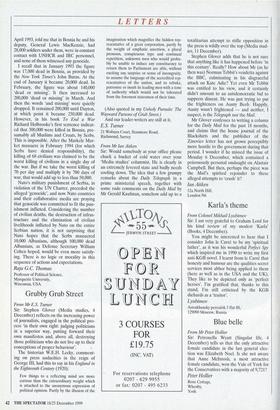Grubby Grub Street
From Mr ES. Turner Sir: Stephen Glover (Media studies, 4 December) reflects on the increasing power of journalists, engaged in the political pro- cess 'in their own right: judging politicians in a superior way, putting forward their own manifestos and, above all, destroying those politicians who do not live up to their conceptions of proper behaviour'.
The historian W.E.H. Lecky, comment- ing on press audacities in the reign of George III, had this to say in his England in the Eighteenth Century (1920):
Few things to a reflecting mind are more curious than the extraordinary weight which is attached to the anonymous expression of political opinion. Partly by the illusion of the imagination which magnifies the hidden rep- resentative of a great corporation, partly by the weight of emphatic assertion, a plural pronoun, conspicuous type and continual repetition, unknown men who would proba- bly be unable to induce any constituency to return them to Parliament are able, without exciting any surprise or sense of incongruity, to assume the language of the accredited rep- resentatives of the nation, and to rebuke, patronise or insult its leading men with a tone of authority' which would not be tolerated from the foremost statesmen of their time.
(Also quoted in my Unholy Pursuits: The Wayward Parsons of Grub Street.)
21 Woburn Court, Stanmore Road, Richmond, Surrey






















































































































 Previous page
Previous page